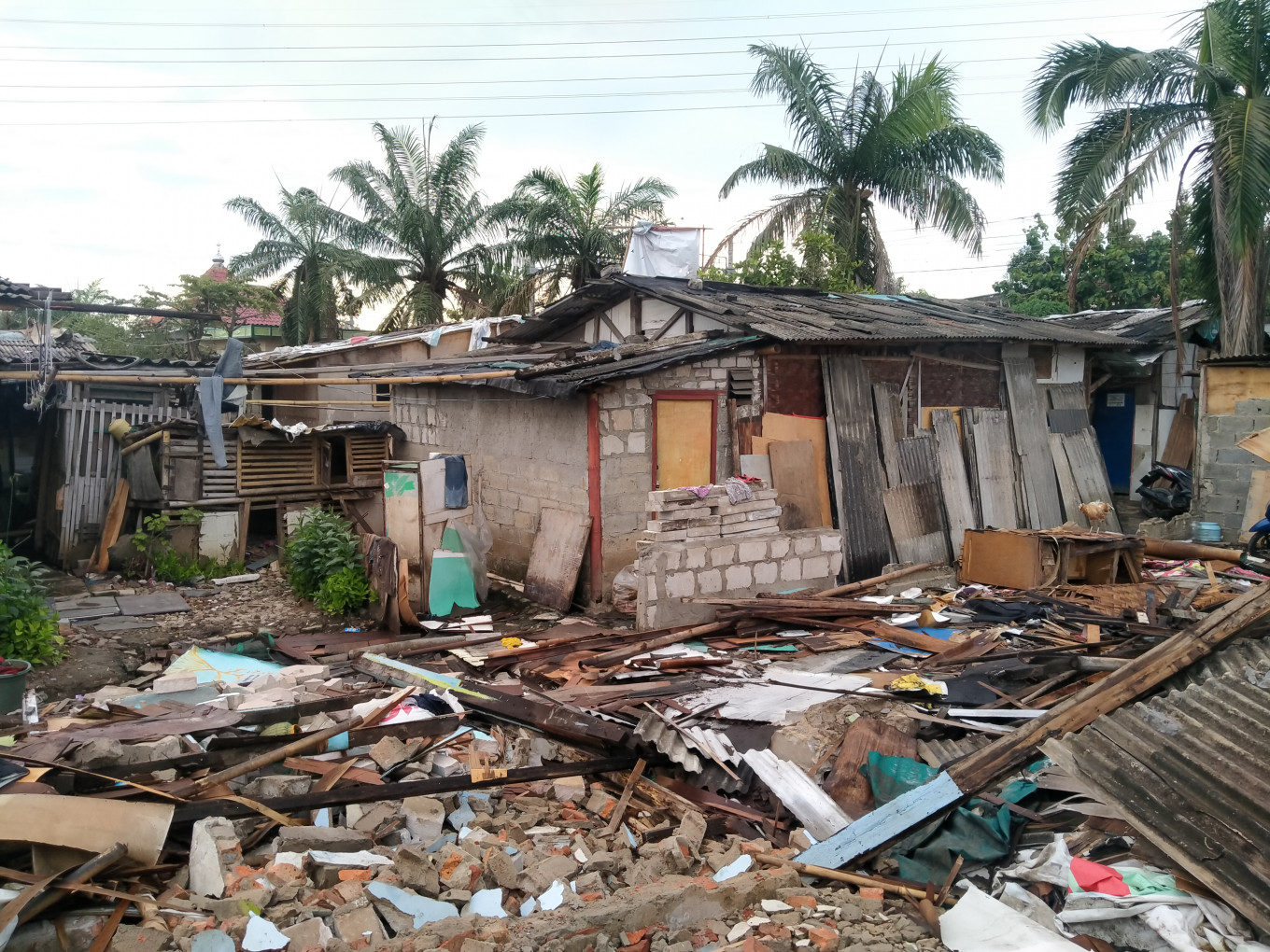Kampung Bayam residents restless amid political transition
To this day, the inauguration of the low-rise apartment building remains the closest Kampung Bayam residents have got to their supposed new home.
Change text size
Gift Premium Articles
to Anyone

F
rom the tent he has been sleeping in for the past three months, Asep Suwenda could just make out the silhouette of Kampung Susun Bayam (KSB).
The city built the low-rise apartments dubbed "vertical village" to house the displaced Kampung Bayam residents whose homes were demolished in 2020 to make way for the Jakarta International Stadium (JIS) in Tanjung Priok, North Jakarta.
But four months since the construction of the building was completed, and almost as long as the five-month construction process that started in May and ended in October, Asep’s fate remains in limbo.
City-owned PT Jakarta Propertindo (Jakpro), which was in charge of construction, has yet to allow the Kampung Bayam residents to move in.
“We already have the decree [from the mayor’s office] stating that we could move in, and each family already has received their designated units from Jakpro. [...] Technically, we’ve fulfilled all the necessary requirements,” Asep told The Jakarta Post on Feb. 9.
As head of the Kampung Bayam Residents Brotherhood (PWKB), Asep represents 75 out of the 123 displaced Kampung Bayam families that were set to move into KSB after former Jakarta governor Anies Baswedan inaugurated the building on Oct. 12.
But to this day, the inauguration remains the closest the Kampung Bayam residents have got to their supposed new home. Asep and several residents have since resorted to living out of a tent set up in front of the gates leading to Kampung Susun Bayam, located right next to the grandeur of JIS.
“The families who can no longer afford to rent a place end up here. [...] There’re several children here too, and things can get pretty hard on windy days like today,” PWKB member Ribka told the Post.
Victims of transition
In their communication with Jakpro, Asep said that the company gave the change in administration as an excuse for the holdup.
While KSB was an initiative of Anies under his community action plan policy, which aimed to provide a collective solution to Jakarta’s slum problem together with the affected communities, Anies stepped down as governor days after the building’s inauguration.
His successor, Heru Budi Hartono, proceeded to overhaul Jakpro’s board of directors on Nov. 28.
Asep maintained that the shake-up in Jakarta’s and Jakpro’s administration was outside his purview, but he bemoaned the fact that it was the Kampung Bayam residents who had to suffer the consequences. “They can play politics in whatever form they want, but please don’t leave us hanging like this," said Asep.
The PWKB had tried to bring this matter to Heru directly, protesting outside the City Hall for a week on Dec. 1. While they failed to gain an audience with the governor, the PWKB met with Taufan Bakri, head of Jakarta's National and Political Unity Office, who assured the displaced residents that their pleas had been forwarded to the governor.
But two months after the meeting, Asep has not heard back from City Hall, or if the administration was taking any concrete steps to remedy the situation.
Jakpro corporate secretary Syachrial Syarif told the Post that the company was still discussing the management of the building with the Jakarta government.
“We also hope that the Kampung Bayam residents could move in as soon as possible to the building as originally planned”, said Syachrial on Wednesday. The company has yet to reach an agreement with City Hall on when the government will take over the management of Kampung Susun Bayam under the region’s Public Housing and Settlement Agency.
As a city-owned enterprise, Jakpro’s commercial interests have, in the past, run contrary to the plight of the Kampung Bayam residents. In a series of meetings with the company in November, residents expressed objection to the Rp 750,000 (US$49.38) monthly rent Jakpro put forward, half of the company’s original proposal of Rp 1.5 million.
“Where will the elderly residents find that kind of money? Even we [younger residents] merely work as scavengers, parking attendants and street vendors,” said Ribka. Asep also pointed to Kampung Susun Akuarium as an example, a similar resettlement project where residents have to pay around Rp 200,000 per month for housing, including maintenance costs.
The relationship between Kampung Bayam residents and Jakpro had started on good terms, with residents not putting up a fight against the eviction and Jakpro providing compensation. But after months of inaction and disagreements resulting in a soured relationship, the residents have no choice but to pin their hopes on Heru and the City Hall.
“Our sincere wish is that there could be an institution or an official that could mediate a meeting between us and the [interim governor]. I would be very grateful if there’s anyone who could help,” said Asep.









